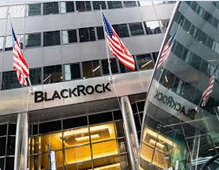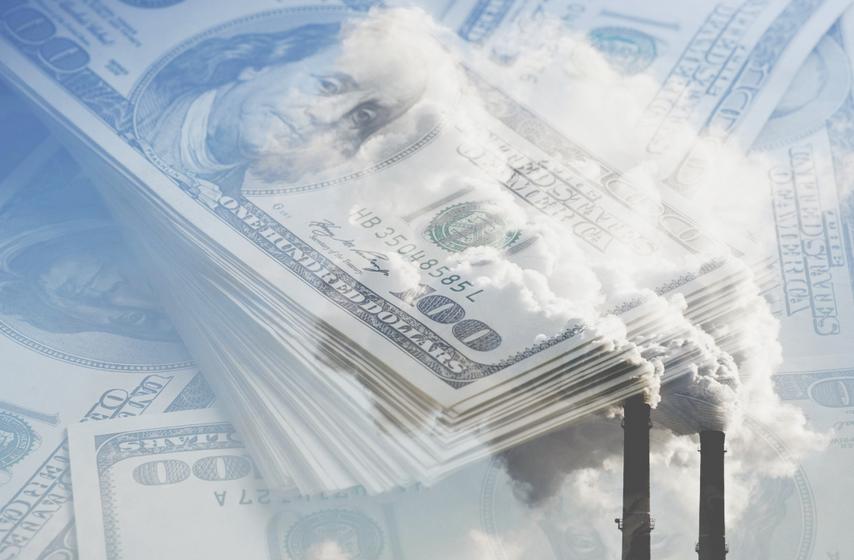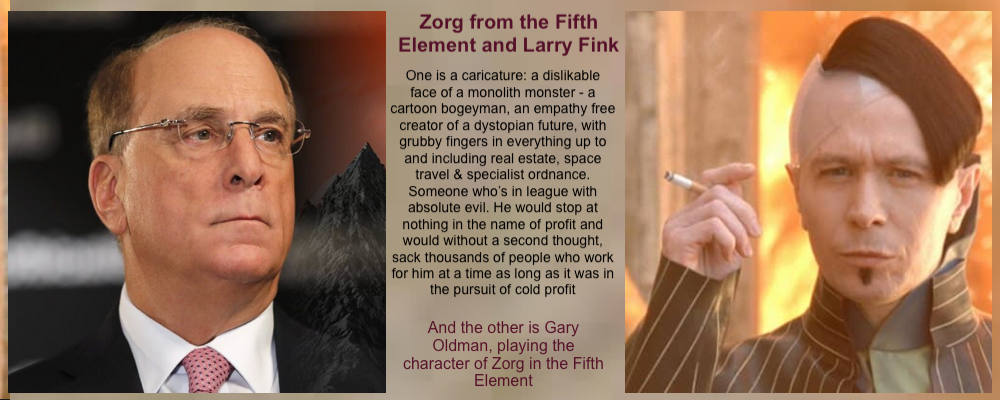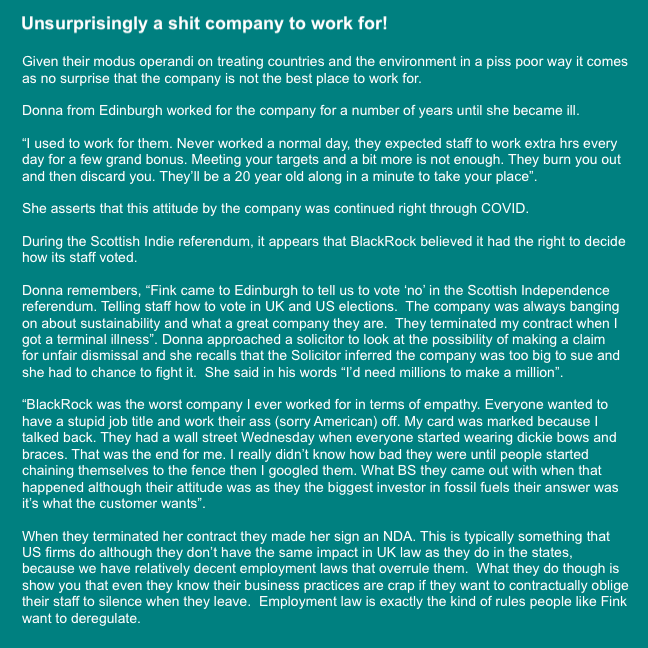We need to talk about BlackRock

We need to talk about BlackRock: the financial entity that has quietly wormed its way into the very fabric of the global economy, all while pretending to champion sustainability and social responsibility. Beneath the glossy promises of greenwashing and corporate philanthropy, BlackRock has become one of the most powerful players in a rigged system, further entrenching wealth inequality and exacerbating the exploitation of both workers and the planet. It’s time we stopped letting this corporate titan off the hook for its role in perpetuating the very injustices it claims to solve.
BlackRock is the world’s largest investment management firm, with over $10 trillion in assets. Founded in 1988, it is a global financial monster that spreads its tentacles across a wide range of sectors, from equities and fixed income to alternative investments and real estate. The firm is a publicly traded company, listed on the New York Stock Exchange as BLK. BlackRock’s ownership is split between institutional investors, such as pension funds and endowments, as well as major shareholders, including Vanguard Group and State Street Corporation.
- The Vanguard Group likes to market itself as the 'people’s champion' of investing, touting low fees and the illusion of democratising wealth. Well it likes to, but of course it isn't - it’s just another cog in the machine that funnels vast amounts of money into the pockets of the super-rich, while keeping the working class in a perpetual cycle of stagnation. As one of the world’s largest asset managers, Vanguard holds stakes in everything from oil giants to tech monopolies, all while claiming to champion responsible investing. In reality, it’s a gatekeeper for the wealthy elite, helping to maintain the status quo where the rich get richer and the rest are left to pick up the crumbs.
- State Street corporation is, well another cheek of the same arse. It too perfected the art of pretending to care about anything other than profit. With its vast influence over global finance, it claims to promote diversity and inclusion while continuing to support companies that thrive on exploitation and environmental destruction. It’s a classic case of lip service: pledging to improve corporate responsibility while being deeply embedded in industries that perpetuate inequality and harm. State Street, in its pursuit of profit, only serves to amplify the power of those already at the top, leaving the rest of us to suffer the consequences of a rigged system.

Despite its public listing, BlackRock’s decision-making power is largely concentrated in the hands of its executives, with Larry Fink, the firm’s CEO and co-founder, being the most prominent figure. At a point in time where wealth inequality is reaching unprecedented levels, it’s difficult to ignore the role of global financial institutions like BlackRock: they are not just a financial powerhouse, they are a symbol of the way global capital consolidates power and influence. Yet, while BlackRock operates with remarkable discretion, its impact on the global economy, the environment, and society is far-reaching, often hurting ordinary people.

Rather than been just an investment firm; it is a key player in the global financial system, exerting influence over industries, governments, and financial markets. The firm holds significant shares in companies across virtually every sector, from energy and technology to healthcare and consumer goods. Its talons are gauging into everything. This gives BlackRock a level of control over markets that many governments can only dream of. When a single entity holds such immense power, it is impossible to ignore the potential risks that come with it, or that it is institutionally corrupt and exploitative.
Think of Gary Oldman’s character, Jean Baptiste Zorg and his company Zorg industries in the Fifth Element. Well, that’s Larry Fink and BlackRock. Only without the cool clothes and the strange headgear. Would Fink make a deal with the Mr Shadow, the Great Evil even if it meant destroying the planet and everyone is it? If it was profitable? You bet your arse he would. BlackRock are practically doing that anyway.

While other sectors of the economy are slowly transitioning towards greener alternatives, BlackRock remains a steadfast investor in fossil and mining industries, showing a clear disregard for the planet’s future. For communities already suffering from the consequences of environmental destruction, BlackRock’s actions speak volumes about the priorities of global capitalism: profits over people, and short-term gain over long-term sustainability.
This concentration of economic power raises fundamental questions about the ability of democratic governments to make independent decisions when vast portions of the economy are controlled by financial giants. BlackRock is unaccountable, and its primary loyalty is not to people, but to profit. Blackrock is also a contradiction. It has invested heavily and made some public commitments to sustainability. At the same time the firm’s investments in fossil fuels paint a different picture. Despite promising to reduce its exposure to climate-damaging industries, BlackRock continued to invest billions in oil and gas companies, including some of the world’s largest polluters and this is a direct contribution to the global climate crisis. For years, BlackRock has been an enabler of industries that profit from environmental degradation, exacerbating the existential threat of climate change.

Its tentacles stretch beyond environmental destruction. It also plays a significant role in the rise of economic inequality. Through its investments, the firm has been at the forefront of the growing wealth gap, profiting from systems that favour the rich and exploit the poor. As wages stagnate and job security evaporates for working-class people, BlackRock continues to make billions off investments in companies that have no interest in raising wages or improving working conditions. The reality is that BlackRock and similar investment firms contribute to a system in which the rich get richer, while ordinary workers are left to bear the brunt of austerity, low wages, and job precarity.
This is not just a side effect of capitalism, this is capitalism in action, and BlackRock is one of its most powerful champions. As workers across the globe fight for better wages, better conditions, and a more just society, BlackRock remains entrenched firmly in the other camp, profiting from a broken system that leaves too many behind.

While BlackRock’s influence extends globally, we need to look at what the fuckers have been getting up to in the UK. The firm is deeply embedded in British politics and policymaking, often behind the scenes, shaping economic decisions that affect the everyday lives of millions. One of the most alarming ways in which BlackRock’s influence manifests in the UK is through its connections to 55 Tufton Street, a feature of this blog on 14th March and a rats nest of the UK’s far-right and libertarian networks. At 55 Tufton Street, a group of think tanks and advocacy organisations, many with clear connections to the far-right, have found a base from which to push their ideologies. These organisations, which include the TaxPayers' Alliance and the Institute of Economic Affairs (IEA), have long been vocal supporters of deregulation, austerity, and the dismantling of public services, ideas that align with the interests of financial giants like BlackRock. In fact, BlackRock has close ties to these organisations, not just in terms of shared ideologies, but through financial support and influence. This network has played a key role in pushing for policies that benefit large corporations and investors, rather than working-class communities. For example, the IEA has long campaigned against regulation, advocating for free-market principles that make it easier for companies like BlackRock to operate without oversight.

The connections between these far-right think tanks and BlackRock are no accident; they form part of a broader strategy to shape public policy in ways that benefit the corporate elite. This unholy alliance between financial giants and far-right political forces is not just a British issue, but a global one. However, the specific influence of BlackRock in the UK, and its ties to the extreme end of the political spectrum, raises alarm bells about the future of democracy and economic justice.
BlackRock’s connections to the armaments industry show what a weapons grade POS this company is. As one of the world’s largest investors, the firm has substantial stakes in major arms manufacturers, including companies that produce weapons for use in wars around the globe. These companies supply everything from conventional weapons to military technologies used in modern conflicts. BlackRock’s investment in such industries has sparked criticism, as it represents not just a financial interest, but an alignment with the military-industrial complex that fuels global conflicts. BlackRock’s influence is evident in numerous international political struggles, where its financial backing helps fund companies involved in war profiteering. Through its investments in arms manufacturers, BlackRock is effectively enabling military operations in countries embroiled in conflict, while reaping substantial returns from the ongoing violence. This relationship between finance and the arms industry highlights the troubling role that investment firms like BlackRock play in perpetuating global instability and conflict and happily arms both sides in a conflict, all in the name of profit. There is nothing ethical about this company at all.

It’s clear that BlackRock’s unchecked power is a problem. If we are to create a fairer, more just economy, we must reconsider the role of such financial giants in our society. Governments must begin to rein in the power of firms like this, enacting stronger regulations to ensure that corporations act in the public interest, not just their own. This means greater transparency, accountability, and restrictions on the ability of financial firms to hold vast amounts of power over entire industries. It also means pushing for stronger climate regulations and divestment from industries that contribute to environmental destruction.
We need to hold BlackRock accountable not just for its financial dealings, but for its impact on our environment, our communities, and our society as a whole.
It also requires balls on the part of Governments, something we are unlikely to see when they emasculated by companies like BlackRock, with most politicians happy just to suck at the tit of this monolith monstrosity.
We need to talk about BlackRock, because it is a cancer on humanity. More importantly, we need to take action to ensure that no one entity, no matter how powerful, is allowed to continue wielding unchecked control over the world’s economy. The future of our planet and the well-being of its people depend on it.
The world has gone mad. If you enjoyed reading this, please feel free to look at the rest of the blogs on www.TetleysTLDR.com. They're free to view, there's no paywall, they aren't monetised and I won't ask you to buy me a coffee. Just a leftie, standing in front of another leftie, asking to be read. All the best, Tetley

